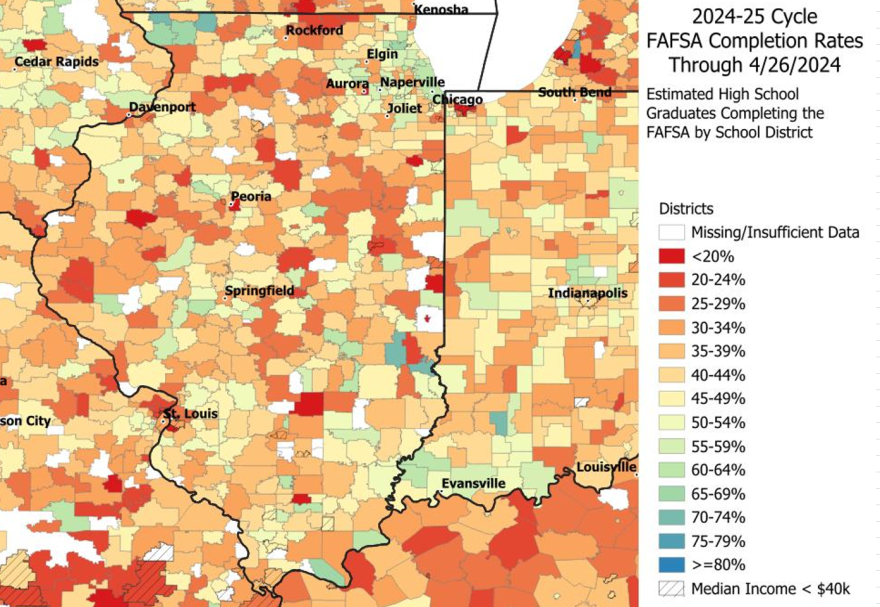By April 26 of last year (2023) about 52% of DeKalb High School students had completed their FAFSA. By April 26 of this year, with the new FAFSA form, it’s about half of that -- down to about 27%. That’s according to the U.S. Department of Education.
Shirley Rouse is a counselor at DeKalb High School who works with seniors. She says that drop in completions means fewer kids qualifying for federal student financial aid like the Pell Grant and eligible for state aid like the MAP grant in Illinois.
What happened? The delayed and botched rollout of the new FAFSA form.
Rouse says, typically, by May 1, known as College Decision Day, pretty much all of her students know where they’re going to school the next year. But not this year.
“A lot of our students didn't know until mid-April how much financial aid they were receiving. For students who had to make corrections, they couldn't do that until mid-April," she said. "So, I still have students who don't have award letters from schools.”
This is months behind the normal schedule where most students receive financial aid award letters in December or January.
This year, students couldn’t even try to submit their FAFSA until late December. But that’s when the errors and glitches started.
Now, obviously, it’s not just a DeKalb problem. It’s an issue that students across the state and the country have encountered. There have been processing errors, technical glitches, and calculation mistakes. Rouse says families who don’t have social security numbers have had particular trouble.
“This year, they could create an account still, but there were major glitches with that and that just got fixed this week," said Rouse. "It was sending them to verify their identity and then it wouldn't allow them to do that. That's impacted quite a few students as well.”
That means forms submitted in early January were in limbo for months before they could try to correct them.
64% of DeKalb School District students are low income. Many may be first-generation college students who aren’t used to filling out FAFSA or maneuvering the college admissions process. DeKalb High School has hosted financial aid nights and FAFSA events since the fall. They’re still holding workshops during lunch to help students.
It’s been really frustrating for counselors like Rouse, and it hasn’t even been easy to find which students need help.
“I couldn't even access who completed the FAFSA until the middle of April," she said. "Last year, we were able to do that in November, so you could connect with kids."
May 1 is known as “College Decision Day” because it’s the admissions deadline at most schools. But, because of those issues, many universities have pushed back those deadlines.

And with some of her students just receiving their financial award packages and other still in the dark, Rouse says they just have less time to make these big decisions about their future.
“I can tell you, in the last few weeks, I've had a lot of students come in like, ‘I received my award letter, I'm thinking Kishwaukee College might be a good option for me’ or ‘this was my No. 1 school and I'm realizing it's not financially an option,'" she said. "So, a lot of students are having to pivot really late in the game."
She didn’t expect this year to be such a mess. It’s disheartening, but she has faith that next year will be a lot better.
“I think they predict 1.5 million students will qualify for the Pell Grant more than in the past the way the form was set up," said Rouse. "So, that's huge."
She’s still seeing finished FAFSA forms roll in and says 30% of DeKalb students have completed it now.
The school year is ending soon. Rouse is encouraging students to email her over the summer if they run into more issues or have questions but says it’s a lot easier to help students navigate this in-person, so they’ll keep up the lunchroom workshops until school lets out.


